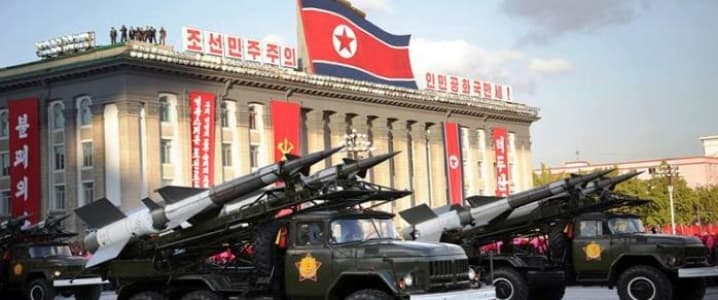An open military conflict in Northern Asia would disrupt more than a third of global seaborne crude oil trade, Wood Mackenzie warned last week amid yet another escalation between North Korea, its neighbors, and the U.S.
Such a conflict would cripple North Asia’s production and refining capacity, the consultancy said. Some 65 percent of Asia’s crude oil refining capacity is located in China, Japan, and South Korea, so the effects of an open war would be far-reaching and potentially long-lasting. The most pressing question, then, is how likely such an open conflict is.
Pyongyang seems determined to expand its military capabilities with intercontinental ballistic missiles that can carry a nuclear head. State media claim that the nuclear head is a fact, releasing a photo featuring the country’s leader Kim Jong Un inspecting said weapon. After a quick succession of ballistic missile tests over the last couple of months that put South Korea, Japan, and the U.S. on red alert, more nuclear talk from Pyongyang is exactly what the world does not need. Yet it is what we are getting.
Talk is not enough to tip the region into a war—possibly even a nuclear war—but it serves to heighten the pressure, and decisions made under pressure are seldom the wisest. Analysts seem to be divided as to the most probable course the events would take.
A recent analysis by SBS News’ Kelsey Munro looks into the two basic scenarios: accept a nuclear North Korea, or prevent it from becoming nuclear as soon as possible. Geopolitics experts seem to be split on which scenario is the more sensible one to follow.
On the one hand, Munro notes, some researchers believe that accepting North Korea’s nuclear capability would prevent a war that would result in hundreds of thousands of casualties and disrupt the Asian economy. This would be a conventional war, since the chances of success for a tactical nuclear strike seem to be too slim to be comfortable with.
On the other hand, acceptance of a nuclear Pyongyang will in all probability lead to other countries in the region going nuclear, ultimately pushing the world closer to a nuclear war as it would be that much harder to exercise any pressure on North Korea after it has solidified its second-strike capability. Related: Are Libyan Oil Production Gains History?
Last week North Korea launched an intercontinental missile over Japan. This Sunday, Defense Secretary Jim Mattis said in a statement that the United States is prepared for “a massive military response” to any attacks from North Korea to it or one of its allies. Mattis added that "We are not looking to the total annihilation of a country, namely North Korea, but as I said, we have many options to do so."
It seems an open war is not as far from reality as opponents would like it to be. Given the amount of refining capacity in the area would be affected and the fact that China, Japan, and South Korea are among the largest consumers of oil, a war would be good news for OPEC and oil bulls. But all of these countries, Wood Mac noted in its report, have solid stocks of crude. This means the effect of a war in Northern Asia on international crude prices may well be short-lived.
Last month, the UN approved a new round of sanctions against North Korea that would see a third of its annual exports, some US$1 billion, erased. So far, sanctions have failed to have any effect on Pyongyang’s missile development plans. Notable as it may be that Russia and China supported this round, its effects are doubtful – will Kim return to the negotiations table and agree to suspend his nuclear program? It’s hard to believe that is a possibility, so all options remain on the table while China continues to stock up on crude.
By Irina Slav for Oilprice.com
More Top Reads From Oilprice.com:
- These Numbers Suggest Yet Another Surge In The Permian
- Gazprom’s Gas Dominance Grows In Europe
- The Next Step In Mexico’s Oil & Gas Privatization Push



















In any case, I think that Steve Bannon was exactly right in regard to his comments about a possible attack on North Korea:
https://www.washingtonpost.com/news/josh-rogin/wp/2017/08/17/bannon-is-right-about-north-korea/?utm_term=.27858e79ca1a
Excerpt:
In Washington, a “Kinsley gaffe” is when someone tells an obvious truth that isn’t supposed to be said. Such was the case when White House chief strategist Stephen K. Bannon told a reporter, in an interview published Wednesday, that there is no viable military option for stopping North Korea’s nuclear and missile programs.
Bannon’s view is that any preemptive attack on North Korea would result in horrendous casualties in South Korea and elsewhere and therefore cannot be seriously considered. That view is shared by many officials, former officials and North Korea experts. Whether President Trump believes it is unknown.
By publicly declaring that the U.S. threat of military force in North Korea is a bluff, Bannon may have undermined the credibility of that threat. He may also have nudged the United States toward a more diplomacy-focused approach and reduced the risk of war.
“There’s no military solution [to North Korea’s nuclear threats], forget it,” Bannon told the American Prospect. “Until somebody solves the part of the equation that shows me that 10 million people in Seoul don’t die in the first 30 minutes from conventional weapons, I don’t know what you’re talking about, there’s no military solution here, they got us.”
Daily I am reading your news and I find them really helpful and I would like to place a question.
In your last sentence you wrote "...while China continues to stock up on crude".
Until now I have not found a topic that explains what is the current situation with crude oil in China. If it is possible could you please write about this topic and give some numbers regarding inventories, imports etc.
I hope I am not causing any inconvenience to you.